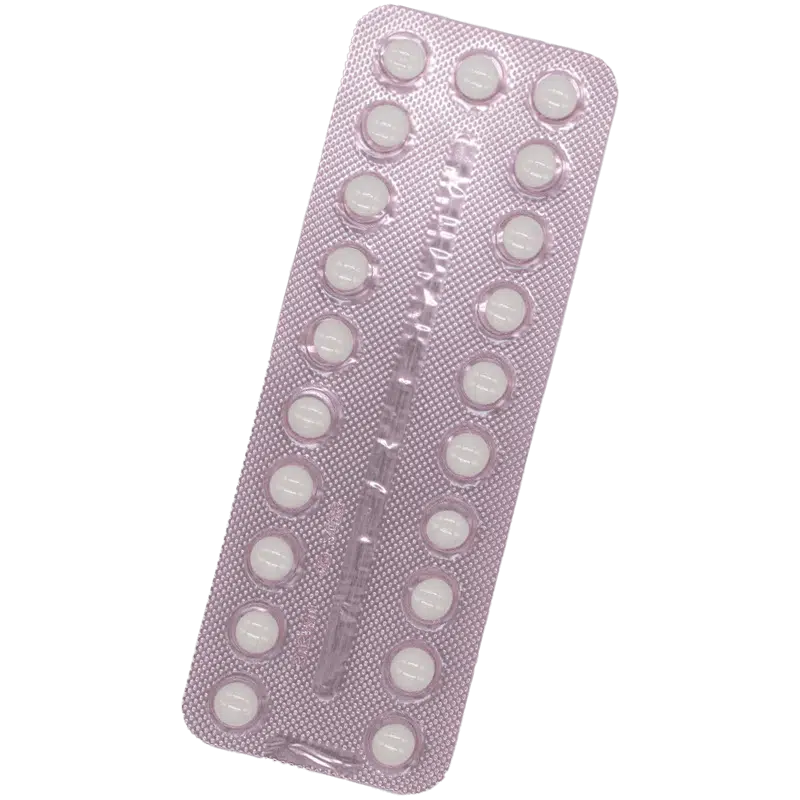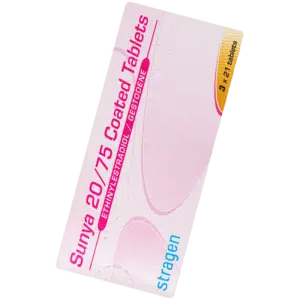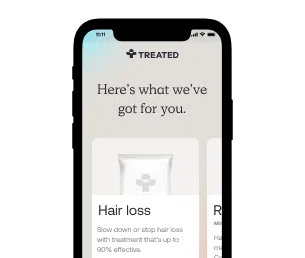Effective 21-day combined pill to help prevent pregnancy.


Sunya is a combined hormonal contraceptive pill. If taken correctly, there’s less than a 1% chance that you’ll get pregnant.
Getting a contraceptive pill is quick and easy with Treated. You can talk with our clinicians, choose your pill, order Sunya online and get it delivered to your door.
Sunya is what’s known as a ‘monophasic’ pill, which means that each pill in a strip has the same amount of hormones in it. It’s also sometimes referred to as a ‘21-day pill’, because you take one pill every day for 21 days (and then have a 7-day pill-free break).
Like other combined pills, Sunya takes a tri-pronged approach to stopping pregnancy (it does three things).
The two hormones in it stop your ovaries from releasing an egg (ovulating) to protect you from pregnancy.
The mucus in the neck of the womb is also made thicker. This makes it harder for sperm to travel to and fertilise an egg.
And while the mucus in the cervix gets thicker, the lining of the uterus is made thinner. The uterine lining thickens naturally as your cycle progresses, and then breaks down when you have your period. But by keeping it thin, the combined pill makes it trickier for an egg to latch on to the uterine lining and develop.
When the uterine lining is thinner, it normally makes your periods lighter, and less sore too.
Very. If you take it correctly, it’s over 99% effective. To break this down: for every 100 women that take Sunya over a 12 month period perfectly, less than one will get pregnant.
If you make mistakes when you take it or if you miss pills here and there, it’s not quite as effective: around 91%. So around nine women in every 100 will get pregnant over the course of a year. So it’s very important that you take it as instructed in the leaflet that comes with your pill.

How we source info.
When we present you with stats, data, opinion or a consensus, we’ll tell you where this came from. And we’ll only present data as clinically reliable if it’s come from a reputable source, such as a state or government-funded health body, a peer-reviewed medical journal, or a recognised analytics or data body. Read more in our editorial policy.
If you start taking Sunya on the first day of your period, you’ll get immediate protection from pregnancy. You can also start to take it on days 2-5 of your cycle, but you’ll need to use additional contraception such as condoms for the first seven days.
Take one pill every day for 21 days at the same time. You can take Sunya either with or without food. Whichever you prefer.
Next to each pill is printed the day of the week. If you start taking Sunya on a Wednesday for example, take the pill with ‘Wednesday’ printed next to it. Follow the direction of the arrow on the strip until you’ve taken all 21 pills.
Once you’ve taken all 21 pills, take a 7-day, ‘pill-free’ break. Over this 7-day break, you should experience a bleed. On the ‘eighth’ day (that is, the day after your 7-day break), start a new strip, even if you’re still bleeding. This should mean that you start a new strip on the same day of the week each time.
If you forget to take one pill during week 1 of your cycle, take the pill you missed as soon as you remember, even if this means having to take two pills at the same time. Take any pills that follow at the usual time and use extra contraception such as condoms for the next seven days. If you had sex during the week before you missed a pill, or if you forget to start a new strip on time after the 7-day pill-free break, you could be pregnant. Let our clinician know and they can advise you.
Should you forget to take one pill during week 2 of your period, take the pill you forgot as soon as you remember, even if it means taking two pills at the same time. Take any pills that follow as you would normally. Your protection from pregnancy should not be affected, and you don’t need to use any additional contraception.
If you forget to take one pill in week 3 of your cycle, you can do one of two things.
Take the pill that you forgot as soon as you remember, even if it means taking two pills at the same time. Take any pills that follow at the usual time, but rather than take a 7-day pill-free break, move straight on to your next strip. It’s likely that you’ll get a withdrawal bleed at the end of the second strip, and you may also experience some spotting or breakthrough bleeding.
Alternatively, you can stop the strip and take a 7-day, pill-free break, making a note of the day on which you forgot to take your pill. If you’d prefer to start a new strip on a certain day of the week, make the pill-free period less than seven days.
Either of these two methods should protect you from getting pregnant.
If you have forgotten any pills in a strip, and you don’t experience any bleeding during the first 7-day pill-free break, you may be pregnant. Send a message to our prescriber using your Treated account and they can advise you from there.

How we source info.
When we present you with stats, data, opinion or a consensus, we’ll tell you where this came from. And we’ll only present data as clinically reliable if it’s come from a reputable source, such as a state or government-funded health body, a peer-reviewed medical journal, or a recognised analytics or data body. Read more in our editorial policy.
Have something specific you want to know? Search our info below, or ask our experts a question if you can’t find what you’re looking for.
The long-term influence of combined oral contraceptives on body weight. Human Reproduction. U.K. Oxford Academic.
Combined oral contraceptive pills for treatment of acne. Pubmed.gov. U.S.A. N.I.H.
It helps me a lot.
It helps me a lot. My monthly period is become regular
Very good!
Very good!
Treated
Good, efficient service
Excellent service
Excellent service
So satisfied!
So satisfied!
Great experience
I ordered my medication as I didn’t think mine would arrive in time and was so easy to do so. Would recommend this to everyone. Easy to use!
Professional
Great service. Love the renewals that automatically arrive without my thinking.
Thank you. It's that tablets
Thank you. It's that tablets which I needed.
They gave it me when everywhere else was out of stock lol
They helped me thank u
Thanks
Thanks
Efficient.
Efficient service, great delivery, seems well organised, thank-you.
Excellent
Easy speedy service would highly recommend
For now it is okay
For now it is okay I don't feel nausea when I take them
Seamless Service and Reliable Contraceptive Solution
My experience with Treated has been nothing short of exceptional. Transitioning from the US to the UK, I needed to replenish my contraceptive pill supply, and Treated made the process incredibly smooth and hassle-free. The online consultation with a doctor was convenient and reassuring. I was able to explain my requirements, and the doctor provided me with several suitable alternatives, ultimately leading me to Eloine, which has been a perfect fit for me so far. The guidance and support I received throughout the process were invaluable, and it was evident that the doctor had my best interests at heart. What truly impressed me was the speed of the entire process. Once I made my decision and completed the necessary steps, my order was promptly dispatched and arrived at my doorstep the very next day. Such efficiency is a rarity these days, and I commend Treated for their commitment to customer satisfaction. As for the product itself, I have been using Eloine for just over a week now, and I am pleased to report that everything is going well. It's comforting to know that I have access to a reliable contraceptive option that meets my needs, all thanks to Treated. I am grateful for the peace of mind they have provided me, and I will certainly be returning for any future healthcare needs. Thank you, Treated, for exceeding my expectations.
Brilliant
Brilliant service, knowledgeable staff. Medication is working. Thank you
I have been using Yasmin
I have been using Yasmin and it has improved my cycle to be better.
Great service
Really fast and efficient service and great communication with the team.
Great service
Would recommend
Pro, helpful and reactive!
Thank you. You guys have been very reactive in sending me my new order in emergency, as you had IT issues and the automatic renewal of pills is still not working (parcel not cleared up from previous order).
Perfect
No worries of having to re order. All done and sent in good time. Thank you as always.
Very good
Very good
Good use
Fine tablets. Do the job.
Perfect
Perfect
Amazing!
Always so helpful whenever I have any questions
Great service
I recently needed to make a change and the website was not allowing this. The team at Treated, picked it up and were able to resolve successfully for me, quickly. Thank you.
Everything good
Everything good
Excellent service
Quick and easy service to use. When I had a query they answered promptly and were helpful. Thanks

Registered with GMC (No. 4624794)
Meet Daniel
Registered with GPhC (No. 2202465)
Meet Sanjeda
Registered with GPhC (No. 2070724)
Meet CraigDelivery, consultation, treatment. It’s all included in the price.
| Quantity | Starting from |
|---|---|
| 63 Tablets | £32.95 |
| 126 Tablets | £55.95 Save £9.95 |
| 252 Tablets | £89.95 Save £41.85 |
| Quantity | Starting from |
|---|---|
| 63 Tablets | £34.95 |
| 126 Tablets | £55.95 Save £13.95 |
| 252 Tablets | £89.95 Save £49.85 |
| Quantity | Starting from |
|---|---|
| 84 Tablets | £34.95 |
| 168 Tablets | £55.95 Save £13.95 |
| 336 Tablets | £89.95 Save £49.85 |
| Quantity | Starting from |
|---|---|
| 63 Tablets | £29.95 |
| 126 Tablets | £44.95 Save £14.95 |
| 252 Tablets | £75.95 Save £43.85 |
| Quantity | Starting from |
|---|---|
| 63 Tablets | £32.95 |
| 126 Tablets | £49.95 Save £15.95 |
| 252 Tablets | £84.95 Save £46.85 |
| Quantity | Starting from |
|---|---|
| 63 Tablets | £32.95 |
| 126 Tablets | £47.95 Save £17.95 |
| 252 Tablets | £78.95 Save £52.85 |
| Quantity | Starting from |
|---|---|
| 63 Tablets | £26.95 |
| 126 Tablets | £41.95 Save £11.95 |
| 252 Tablets | £72.95 Save £34.85 |
| Quantity | Starting from |
|---|---|
| 63 Tablets | £39.95 |
| 126 Tablets | £63.95 Save £15.95 |
| 252 Tablets | £109.95 Save £49.85 |
| Quantity | Starting from |
|---|---|
| 63 Tablets | £34.95 |
| 126 Tablets | £57.95 Save £11.95 |
| 252 Tablets | £91.95 Save £47.85 |
| Quantity | Starting from |
|---|---|
| 63 Tablets | £27.95 |
| 126 Tablets | £43.95 Save £11.95 |
| 252 Tablets | £78.95 Save £32.85 |
| Quantity | Starting from |
|---|---|
| 84 Tablets | £27.95 |
| 168 Tablets | £43.95 Save £11.95 |
| 336 Tablets | £78.95 Save £32.85 |
| Quantity | Starting from |
|---|---|
| 63 Tablets | £25.95 |
| 126 Tablets | £41.95 Save £9.95 |
| 252 Tablets | £66.95 Save £36.85 |
| Quantity | Starting from |
|---|---|
| 63 Tablets | £41.95 |
| 126 Tablets | £61.95 Save £21.95 |
| 252 Tablets | £98.95 Save £68.85 |
We know health, but you know you.
Our experts tell you what’s safe, but you decide what’s best.
Answer a few questions and tell us about yourself. Get tailored advice from our clinicians so you can choose better.

Choose your treatment and how often you have it delivered.

We know things change. It’s the nature of life. We’ll check in regularly to make sure your treatment is still right for you.
Pause. Change. Skip. Start again. Any time you like.
Always arrives on time and I’m kept informed of progress.
I have had it previously from my G.P so It worked as expected, extremely well. My problem is an accessing my G.P practice, they put ED well down their list of priorities. I found your service excellent, quick and efficient. I fully intend to continue using it
Shipping is speedy and the product is amazing.
Fast, slick service. Very easy to amend subscription when required.
All good.
Great service
Really helped me
Trusted service and great service - next day delivery and I can rely on them to send regularly.
Ordering was straight forward, tablets delivered promptly and well packaged, and instructions were clear, thanks.
100% recomended.Great service
Excellent service
Excellent delivery. Can’t fault.
Quick and efficient service, delivered discreetly the next day. Thank you.
Effective
Great service, no wait time
Great
Quick assessing for medicine suitability. Quick delivery and good communication throughout.
Straightforward and quick service!
Good however communication could sometimes be better
Easy and good procedure to get treatment
Excellent product
Excellent service!!! Ordered what I needed sent a picture of my prescription and the parcel arrived the next day!!! Will definitely order again and have recommended to others!!!
Fast shipping
Very quick service all round
So quick and simple. Recommend
Great
Very convenient hassle free service.
Easy to use good communication and fast shipping
Great service
Efficient no issues re delivery
Fabulous service
Brilliant service. Not a bad word to say!
It was fast, professional and it's the right med for what I selected in there.
This review requires content. Oh well..
Great service, quite effortless.
Top notch
Brill service
N/a
Excellent service quick and easy to use
Fast and exact order
Superb service and quick delivery 10/10
Excellent service
Thank you for fast delivery
Shipping is extremely quick and satisfiying
Good stuff
Good service
Great fast delivery
Combined pills: Here are some other options.
Standard oestrogen dose. Similar to Millinette and Katya. 21 and 28 pill options available.
Comes as a 'standard' oestrogen dose or a lower dose option. Very similar to Marvelon and Mercilon.
Standard oestrogen dose pill that's very similar to Femodene and Millinette.
Safest category pill, helps with heavy menstrual bleeding. Very similar to Rigevidon and Microgynon.
Very similar to Yasmin. Can help with PMS and making your periods more regular.
Pill with a 'regular' oestrogen dose. Comes in a 21 pack. Very similar to Cimizt and Gedarel 30.
Safest category pill that reduces heavy bleeding. Same hormone mix as Levest and Rigevidon.
Very similar to Microgynon and Levest. Safest category pill that helps with heavy menstrual bleeds.
Well known pill that reduces PMS symptoms and can help to make your periods more regular.
We're making healthcare more about you. Sign up to our newsletter for personalised health articles that make a difference.
Disclaimer: The information provided on this page is not a substitute for professional medical advice, diagnosis, or treatment. If you have any questions or concerns about your health, please talk to a doctor.
We couldn't find what you're looking for.
Here's everything we treat. Or, if you're looking for something we don't have yet, you can suggest something.
If there’s a particular treatment or condition you’re looking for, tell us and we’ll look into it for you.
Submit your question here, or tell us if you’ve found an issue on our site.
We’ll get back to you very soon. We aim to respond to all queries in one working day.
You’re signed up to our newsletter. Keep an eye on your inbox for our latest update.
By clicking 'Subscribe now' you're agreeing to our Privacy Policy.
We’ve sent you an email asking you to confirm your email address.